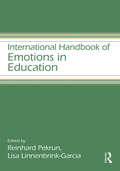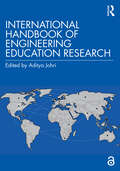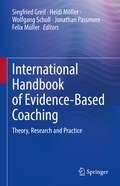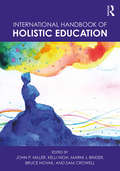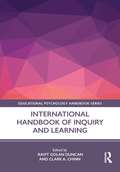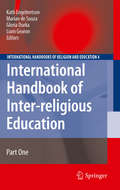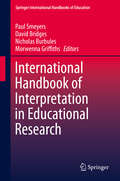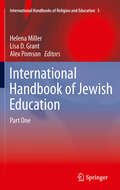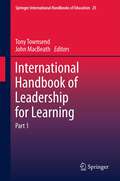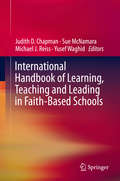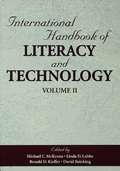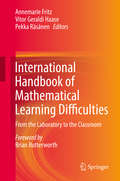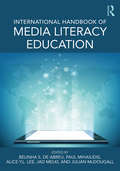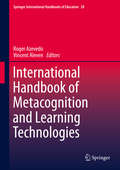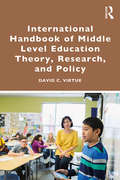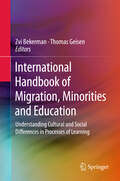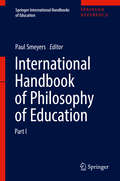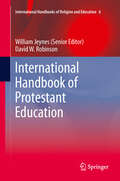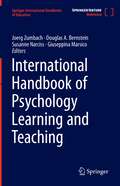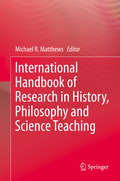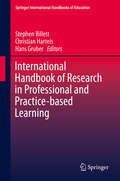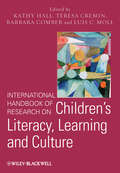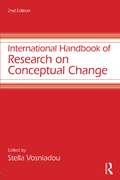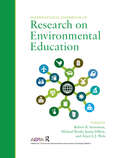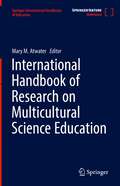- Table View
- List View
International Handbook of Emotions in Education (Educational Psychology Handbook)
by Reinhard Pekrun Lisa Linnenbrink-GarciaFor more than a decade, there has been growing interest and research on the pivotal role of emotions in educational settings. This ground-breaking handbook is the first to highlight this emerging field of research and to describe in detail the ways in which emotions affect learning and instruction in the classroom as well as students’ and teachers’ development and well-being. Informed by research from a number of related fields, the handbook includes four sections. Section I focuses on fundamental principles of emotion, including the interplay among emotion, cognition, and motivation, the regulation of emotion, and emotional intelligence. Section II examines emotions and emotion regulation in classroom settings, addressing specific emotions (enjoyment, interest, curiosity, pride, anxiety, confusion, shame, and boredom) as well as social-emotional learning programs. Section III highlights research on emotions in academic content domains (mathematics, science, and reading/writing), contextual factors (classroom, family, and culture), and teacher emotions. The final section examines the various methodological approaches to studying emotions in educational settings. With work from leading international experts across disciplines, this book synthesizes the latest research on emotions in education.
International Handbook of Engineering Education Research
by Aditya JohriThis comprehensive handbook offers a broad overview of contemporary research on engineering education and its practical application. Over the past two decades, the field of engineering education research (EER) has become a vibrant and impactful community with new journals, conferences, and doctoral and research programs established across the globe. The increased interest in this area has helped improve the education and training of the next generation of engineers, as well as supporting growth in the use of technology for teaching and learning, increased attention to broadening participation, diversity and inclusion in the field, and a wide international expansion of the field. Drawing on the work of 100 expert contributors from over 20 countries, this volume covers both emergent and established areas of research within engineering education, giving voice to newcomers to the field as well as perspectives from established experts. Contents include: Sociocognitive and affective perspectives on engineering education. Technology and online learning in engineering education. Cultural and ethical issues including diversity, equity, and inclusion in engineering education. Curriculum design, teaching practices, and teacher education at all levels. Research methods and assessment in engineering education. This book offers an innovative and in-depth overview of engineering education scholarship and practice, which will be of use to researchers in engineering education, engineering educators and faculty, teacher educators in engineering education or STEM education, and other engineering and STEM-related professional organizations. The Open Access version of this book, available at http://www.taylorfrancis.com, has been made available under a Creative Commons Attribution-Non Commercial-No Derivatives (CC-BY-NC-ND) 4.0 license.
International Handbook of Evidence-Based Coaching: Theory, Research and Practice
by Jonathan Passmore Heidi Möller Wolfgang Scholl Felix Müller Siegfried GreifThis handbook comprehensively covers the fundamental key concepts in coaching research and evidence-based practice and shows how coaching can be applied to multiple contexts. It provides coaching scholars, researchers and practitioners with detailed review of the key concepts, research and new insights into coaching research and practice. This key reference work includes over 70 contributions from more than 110 leading researchers and practitioners in the field across countries, and deftly combines theory with case studies and applications from psychology, sociology, business administration, organizational studies, education, and communication studies. This handbook, edited by the top scholars in the field, is meant for an academic as well as a professional readership, and is an invaluable resource for coaches, clients, coaching institutes and associations, and students of coaching.
International Handbook of Holistic Education
by John P. Miller Marni J. Binder Kelli Nigh Bruce Novak Sam CrowellProviding a comprehensive overview of holistic education’s history, conceptions, practices, and research, this Handbook presents an up-to-date, global picture of the field. Organized in five sections, the Handbook lays out the field’s theoretical and historical foundations; offers examples of holistic education in practice with regard to schools, programs, and pedagogies at all levels; presents research methods used in holistic education; outlines the growing effort among holistic educators to connect holistic teaching and learning with research practice; and examines present trends and future areas of interest in program development, inquiry, and research. This volume is a must-have resource for researchers and practitioners and serves as an essential foundational text for courses in the field.
International Handbook of Inquiry and Learning (Educational Psychology Handbook)
by Clark A. Chinn Ravit Golan DuncanInternational Handbook of Inquiry and Learning is an overview of scholarship related to learning through and engagement in inquiry. Education takes on complex dimensions when learners solve problems, draw conclusions, and create meaning not through memorization or recall but instead through active cognitive, affective, and experiential processes. Drawing from educational psychology and the learning sciences while encompassing key subdisciplines, this rigorous, globally attentive collection offers new insights into what makes learning through inquiry both possible in context and beneficial to outcomes. Supported by foundational theories, key definitions, and empirical evidence, the book’s special focus on effective environments and motivational goals, equity and epistemic agency among learners, and support of teachers sets powerful, multifaceted new research directions in this rich area of study.
International Handbook of Inter-religious Education
by Kath Engebretson Gloria Durka Marian De Souza Liam GearonThis Handbook has the potential to redress the distortion of information about particular religions, to add to understanding about what religions have in common, and to suggest how they can work together for justice and peace. In the present day there is a vital resurgence of interest in religions, with new movements emerging from long established religious traditions. There is also, around the world, a growing sense of the need to preserve indigenous religions, even when these have accommodated to imported traditions. The Handbook gives a voice to this resurgence of interest, and addresses inter-religious education from a range of religious viewpoints and contexts. The publication is very timely especially in light of the need for religions of the world to together contemplate and actively promote human rights, social justice and peace, for religions have a specific mandate for this.
International Handbook of Interpretation in Educational Research
by Paul Smeyers Nicholas C. Burbules David Bridges Morwenna GriffithsThis handbook focuses on the often neglected dimension of interpretation in educational research. It argues that all educational research is in some sense 'interpretive', and that understanding this issue belies some usual dualisms of thought and practice, such as the sharp dichotomy between 'qualitative' and 'quantitative' research. Interpretation extends from the very framing of the research task, through the sources which constitute the data, the process of their recording, representation and analysis, to the way in which the research is finally or provisionally presented. The thesis of the handbook is that interpretation cuts across the fields (both philosophically, organizationally and methodologically). By covering a comprehensive range of research approaches and methodologies, the handbook gives (early career) researchers what they need to know in order to decide what particular methods can offer for various educational research contexts/fields. An extensive overview includes concrete examples of different kinds of research (not limited for example to 'teaching' and 'learning' examples as present in the Anglo-Saxon tradition, but including as well what in the German Continental tradition is labelled 'pädagogisch', examples from child rearing and other contexts of non-formal education) with full description and explanation of why these were chosen in particular circumstances and reflection on the wisdom or otherwise of the choice - combined in each case with consideration of the role of interpretation in the process. The handbook includes examples of a large number of methods traditionally classified as qualitative, interpretive and quantitative used across the area of the study of education. Examples are drawn from across the globe, thus exemplifying the different 'opportunities and constraints' that educational research has to confront in different societies.
International Handbook of Jewish Education
by Alex Pomson Lisa D. Grant Helena MillerThe International Handbook of Jewish Education, a two volume publication, brings together scholars and practitioners engaged in the field of Jewish Education and its cognate fields world-wide. Their submissions make a significant contribution to our knowledge of the field of Jewish Education as we start the second decade of the 21st century. The Handbook is divided broadly into four main sections: Vision and Practice: focusing on issues of philosophy, identity and planning -the big issues of Jewish Education.Teaching and Learning: focusing on areas of curriculum and engagementApplications, focusing on the ways that Jewish Education is transmitted in particular contexts, both formal and informal, for children and adults.Geographical, focusing on historical, demographic, social and other issues that are specific to a region or where an issue or range of issues can be compared and contrasted between two or more locations.This comprehensive collection of articles providing high quality content, constitutes a difinitive statement on the state of Jewish Education world wide, as well as through a wide variety of lenses and contexts. It is written in a style that is accessible to a global community of academics and professionals.
International Handbook of Leadership for Learning
by John Macbeath Tony TownsendThe International Handbook of Leadership for Learning brings together chapters by distinguished authors from thirty-one countries in nine different regions of the world. The handbook contains nine sections that provide regional overviews; a consideration of theoretical and contextual aspects; system and policy approaches that promote leadership for learning with a focus on educating school leaders for learning and the role of the leader in supporting learning. It also considers the challenge of educating current leaders for this new perspective, and how leaders themselves can develop leadership for learning in others and in their organisations, especially in diverse contexts and situations. The final chapter considers what we now know about leadership for learning and looks at ways this might be further improved in the future. The book provides the reader with an understanding of the rich contextual nature of learning in schools and the role of school leaders and leadership development in promoting this. It concludes that the preposition 'for' between the two readily known and understood terms of 'leadership' and 'learning' changes everything as it foregrounds learning and complexifies, rather than simplifies, what that word may mean. Whereas common terms such as 'instructional leadership' reduce learning to 'outcomes', leadership for learning embraces a much wider, developmental view of learning.
International Handbook of Learning, Teaching and Leading in Faith-Based Schools
by Yusef Waghid Judith D. Chapman Sue Mcnamara Michael J. ReissThe International Handbook on Learning, Teaching and Leading in Faith Based Schools is international in scope. It is addressed to policy makers, academics, education professionals and members of the wider community. The book is divided into three sections. (1) The Educational, Historical, Social and Cultural Context, which aims to: Identify the educational, historical, social and cultural bases and contexts for the development of learning, teaching and leadership in faith-based schools across a range of international settings; Consider the current trends, issues and controversies facing the provision and nature of education in faith-based schools; Examine the challenges faced by faith-based schools and their role and responses to current debates concerning science and religion in society and its institutions. (2) The Nature, Aims and Values of Education in Faith-based Schools, which aims to: Identify and explore the distinctive philosophies, characteristics and guiding principles, values, concepts and concerns underpinning learning, teaching and leadership in faith-based schools; Identify and explore ways in which such distinctive philosophies of education challenge and expand different norms and conventions in their surrounding societies and cultures; Examine and explore some of the ways in which different conceptions within and among different religious and faith traditions guide practices in learning, teaching and leadership in various ways. (3) Current Practice and Future Possibilities, which aims to: Provide evidence of current educational practices that might help to inform and shape innovative and successful policies, initiatives and strategies for the development of quality learning, teaching and leadership in faith-based schools; Examine the ways in which the professional learning of teachers and educational leaders in faith- based settings might be articulated and developed; Consider the ways in which coherence and alignment might be achieved between key national priorities in education and the identity, beliefs, and the commitments of faith-based schools; Examine what international experience shows about the place of faith-based schools in culturally rich and diverse communities and the implications of faith-based schooling for societies of the future.
International Handbook of Literacy and Technology: Volume II
by Michael C. McKenna Linda D. Labbo Ronald D. Kieffer David ReinkingThis Handbook provides a comprehensive and international representation of state-of-the art research, theory, and practice related to principal areas in which significant developments are occurring in the study of literacy and technology. It offers a glimpse of the commonalities faced by literacy educators around the world, together with specific challenges raised by unique circumstances.Volume I of this Handbook endeavored to lay essential groundwork for the study of literacy and technology; it retains an explanatory value that will not weaken over time. Volume II differs considerably in conception. It assumes for the most part a higher level of expertise on the part of readers, and the projects and applications described by the contributors are characterized by greater sophistication. The scope of technology use is broader, and the challenges that have emerged are in sharper focus. A powerful feature of this volume is the addition of commentaries from experts across the field on the potential of technology in key dimensions of literacy. The title of Volume II has changed slightly to reflect the inclusion of contributions on a broad geographic basis. It is now a truly international Handbook, with chapter authors from six countries and five continents.The International Handbook of Literacy and Technology: Volume II is organized in five sections:*The Role of Technology in the New Literacies;*Technology Applications with Specific Populations;*Literacy Software and the Internet;*Teacher Education and Professional Development; and*The Potential of Technology in Key Dimensions of Literacy.The effects of technology on literate activity have been both sweeping and subtle, marked by an increasing variety of changes that are difficult to evaluate and project. Perhaps the only prediction that can be offered with certainty is that the impact of technology is irreversible. Specific changes may come and go, but literacy and technology seem inextricably linked. This Handbook is dedicated to that linkage and to examining the intricacies that define it.International Handbook of Literacy and Technology: Volume II is an essential reference for researchers, professionals, and students in reading/literacy education, literacy and technology, educational technology, and related areas, and will serve well as a text for upper-level and graduate courses on these topics.
International Handbook of Mathematical Learning Difficulties: From the Laboratory to the Classroom
by Pekka Räsänen Annemarie Fritz Vitor Geraldi HaaseThis comprehensive volume provides teachers, researchers and education professionals with cutting edge knowledge developed in the last decades by the educational, behavioural and neurosciences, integrating cognitive, developmental and socioeconomic approaches to deal with the problems children face in learning mathematics.The neurocognitive mechanisms and the cognitive processes underlying acquisition of arithmetic abilities and their significance for education have been the subject of intense research in the last few decades, but the most part of this research has been conducted in non-applied settings and there’s still a deep discrepancy between the level of scientific knowledge and its implementation into actual educational settings. Now it’s time to bring the results from the laboratory to the classroom. Apart from bringing the theoretical discussions to educational settings, the volume presents a wide range of methods for early detection of children with risks in mathematics learning and strategies to develop effective interventions based on innovative cognitive test instruments. It also provides insights to translate research knowledge into public policies in order to address socioeconomic issues. And it does so from an international perspective, dedicating a whole section to the cultural diversity of mathematics learning difficulties in different parts of the world. All of this makes the International Handbook of Mathematical Learning Difficulties an essential tool for those involved in the daily struggle to prepare the future generations to succeed in the global knowledge society.
International Handbook of Media Literacy Education
by Paul Mihailidis Belinha S. De Abreu Julian McDougall Alice Y.L. Lee Jad MelkiAt the forefront in its field, this Handbook examines the theoretical, conceptual, pedagogical and methodological development of media literacy education and research around the world. Building on traditional media literacy frameworks in critical analysis, evaluation, and assessment, it incorporates new literacies emerging around connective technologies, mobile platforms, and social networks. A global perspective rather than a Western-centric point of view is explicitly highlighted, with contributors from all continents, to show the empirical research being done at the intersection of media, education, and engagement in daily life. Structured around five themes—Educational Interventions; Safeguarding/Data and Online Privacy; Engagement in Civic Life; Media, Creativity and Production; Digital Media Literacy—the volume as a whole emphasizes the competencies needed to engage in meaningful participation in digital culture.
International Handbook of Metacognition and Learning Technologies
by Vincent Aleven Roger AzevedoIntegrating all aspects of the fields of metacognition and learning technologies, this book describes features of the learning technologies and how they have been designed to study and support metacognitive processing and self-regulated learning.
International Handbook of Middle Level Education Theory, Research, and Policy
by David VirtueThe International Handbook of Middle Level Education Theory, Research, and Policy is a landmark resource for researchers, graduate students, policy makers, and practitioners who work in middle level education and associated fields of study. The volume provides an overview of the current state of middle level education theory, research, and policy; offers analysis and critique of the extant literature in the field; and maps new directions for research and theory development in middle level education. The handbook meets a pressing need in the field for a resource that is comprehensive in its treatment of middle level research and international in scope. Chapter authors provide rationales for middle level education research and definitions of the field; discuss philosophical approaches and underpinnings for middle level education research; describe and critique frameworks for quality in middle level education; review research about young adolescent learners, middle level school programming, and educator preparation; and analyze public policies affecting middle level education at national, regional, and local levels.
International Handbook of Migration, Minorities and Education
by Zvi Bekerman Thomas GeisenMigrants and minorities are always at risk of being caught in essentialized cultural definitions and being denied the right to express their cultural preferences because they are perceived as threats to social cohesion. Migrants and minorities respond to these difficulties in multiple ways -- as active agents in the pedagogical, political, social, and scientific processes that position them in this or that cultural sphere. On the one hand, they reject ascribed cultural attributes while striving towards integration in a variety of social spheres, e.g. school and workplace, in order to achieve social mobility. On the other hand, they articulate demands for cultural self-determination. This discursive duality is met with suspicion by the majority culture. For societies with high levels of migration or with substantial minority cultures, questions related to the meaning of cultural heterogeneity and the social and cultural limits of learning and communication (e.g. migration education or critical multiculturalism) are very important. It is precisely here where the chances for new beginnings and new trials become of great importance for educational theorizing, which urgently needs to find answers to current questions about individual freedom, community/cultural affiliations, and social and democratic cohesion. Answers to these questions must account for both 'political' and 'learning' perspectives at the macro, mezzo, and micro contextual levels. The contributions of this edited volume enhance the knowledge in the field of migrant/minority education, with a special emphasis on the meaning of culture and social learning for educational processes.
International Handbook of Philosophy of Education (Springer International Handbooks of Education)
by Paul SmeyersThis handbook presents a comprehensive introduction to the core areas of philosophy of education combined with an up-to-date selection of the central themes. It includes 95 newly commissioned articles that focus on and advance key arguments; each essay incorporates essential background material serving to clarify the history and logic of the relevant topic, examining the status quo of the discipline with respect to the topic, and discussing the possible futures of the field. The book provides a state-of-the-art overview of philosophy of education, covering a range of topics: Voices from the present and the past deals with 36 major figures that philosophers of education rely on; Schools of thought addresses 14 stances including Eastern, Indigenous, and African philosophies of education as well as religiously inspired philosophies of education such as Jewish and Islamic; Revisiting enduring educational debates scrutinizes 25 issues heavily debated in the past and the present, for example care and justice, democracy, and the curriculum; New areas and developments addresses 17 emerging issues that have garnered considerable attention like neuroscience, videogames, and radicalization. The collection is relevant for lecturers teaching undergraduate and graduate courses in philosophy of education as well as for colleagues in teacher training. Moreover, it helps junior researchers in philosophy of education to situate the problems they are addressing within the wider field of philosophy of education and offers a valuable update for experienced scholars dealing with issues in the sub-discipline. Combined with different conceptions of the purpose of philosophy, it discusses various aspects, using diverse perspectives to do so. Contributing Editors:Section 1: Voices from the Present and the Past: Nuraan DavidsSection 2: Schools of Thought: Christiane Thompson and Joris VliegheSection 3: Revisiting Enduring Debates: Ann Chinnery, Naomi Hodgson, and Viktor JohanssonSection 4: New Areas and Developments: Kai Horsthemke, Dirk Willem Postma, and Claudia Ruitenberg
International Handbook of Protestant Education
by William Jeynes David W. RobinsonSince their earliest days, institutions providing a Protestant education have always been respected and sought-after for their rigor and relative freedom from dogma--and despite today's secularism and plurality, they remain so. This international handbook is the ultimate companion to protestant schooling worldwide. Its 39 chapters form the most comprehensive and wide-ranging treatment of the subject yet available, addressing Protestant education on all six inhabited continents and featuring the perspectives of leading authorities and public figures. The contributions cover in detail not only the facts and features of Protestant schooling in sundry nations, but also integrate a range of themes common to them all, themes so vital that they are of central concern to Christians around the world and of whatever denomination. Some of these topics are school choice, globalization, Bible pedagogy and character education, the fine arts, parental involvement, and the rise of Christianity in previously inaccessible locations such as China. The handbook's stellar list of authors is a Who's Who of authorities on the subject and includes a renowned American evangelical, a former historian of the US House of Representatives, and White House consultants responsible for framing legislation. The many contributors from outside the USA are leading academics conducting seminal research on numerous topics in the field. Both exhaustive and authoritative, The International Handbook of Protestant Educationwill be an invaluable asset to educators, ministers, parents, policy makers political leaders of any denomination--or none.
International Handbook of Psychology Learning and Teaching (Springer International Handbooks of Education)
by Douglas A. Bernstein Giuseppina Marsico Joerg Zumbach Susanne NarcissThe International Handbook of Psychology Learning and Teaching is a reference work for psychology learning and teaching worldwide that takes a multi-faceted approach and includes national, international, and intercultural perspectives. Whether readers are interested in the basics of how and what to teach, in training psychology teachers, in taking steps to improve their own teaching, or in planning or implementing research on psychology learning and teaching, this handbook will provide an excellent place to start. Chapters address ideas, issues, and innovations in the teaching of all psychology courses, whether offered in psychology programs or as part of curricula in other disciplines. The book also presents reviews of relevant literature and best practices related to everything from the basics of course organization to the use of teaching technology. Three major sections consisting of several chapters each address “Teaching Psychology in Tertiary (Higher) Education”, “Psychology Learning and Teaching for All Audiences”, and “General Educational and Instructional Approaches to Psychology Learning and Teaching”.
International Handbook of Research in History, Philosophy and Science Teaching
by Michael R. MatthewsThis inaugural handbook documents the distinctive research field that utilizes history and philosophy in investigation of theoretical, curricular and pedagogical issues in the teaching of science and mathematics. It is contributed to by 130 researchers from 30 countries; it provides a logically structured, fully referenced guide to the ways in which science and mathematics education is, informed by the history and philosophy of these disciplines, as well as by the philosophy of education more generally. The first handbook to cover the field, it lays down a much-needed marker of progress to date and provides a platform for informed and coherent future analysis and research of the subject. The publication comes at a time of heightened worldwide concern over the standard of science and mathematics education, attended by fierce debate over how best to reform curricula and enliven student engagement in the subjects. There is a growing recognition among educators and policy makers that the learning of science must dovetail with learning about science; this handbook is uniquely positioned as a locus for the discussion. The handbook features sections on pedagogical, theoretical, national, and biographical research, setting the literature of each tradition in its historical context. It reminds readers at a crucial juncture that there has been a long and rich tradition of historical and philosophical engagements with science and mathematics teaching, and that lessons can be learnt from these engagements for the resolution of current theoretical, curricular and pedagogical questions that face teachers and administrators. Science educators will be grateful for this unique, encyclopaedic handbook, Gerald Holton, Physics Department, Harvard University This handbook gathers the fruits of over thirty years' research by a growing international and cosmopolitan community Fabio Bevilacqua, Physics Department, University of Pavia
International Handbook of Research in Professional and Practice-based Learning
by Stephen Billett Christian Harteis Hans GruberThe International Handbook of Research in Professional and Practice-based Learning discusses what constitutes professionalism, examines the concepts and practices of professional and practice-based learning, including associated research traditions and educational provisions. It also explores professional learning in institutions of higher and vocational education as well the practice settings where professionals work and learn, focusing on both initial and ongoing development and how that learning is assessed. The Handbook features research from expert contributors in education, studies of the professions, and accounts of research methodologies from a range of informing disciplines. It is organized in two parts. The first part sets out conceptions of professionalism at work, how professions, work and learning can be understood, and examines the kinds of institutional practices organized for developing occupational capacities. The second part focuses on procedural issues associated with learning for and through professional practice, and how assessment of professional capacities might progress. The key premise of this Handbook is that during both initial and ongoing professional development, individual learning processes are influenced and shaped through their professional environment and practices. Moreover, in turn, the practice and processes of learning through practice are shaped by their development, all of which are required to be understood through a range of research orientations, methods and findings. This Handbook will appeal to academics working in fields of professional practice, including those who are concerned about developing these capacities in their students. In addition, students and research students will also find this Handbook a key reference resource to the field.
International Handbook of Research on Children's Literacy, Learning and Culture
by Luis C. Moll Barbara Comber Teresa Cremin Kathy HallThe International Handbook of Research in Children's Literacy, Learning and Culture presents an authoritative distillation of current global knowledge related to the field of primary years literacy studies.Features chapters that conceptualize, interpret, and synthesize relevant researchCritically reviews past and current research in order to influence future directions in the field of literacyOffers literacy scholars an international perspective that recognizes and anticipates increasing diversity in literacy practices and cultures
International Handbook of Research on Conceptual Change: International Handbook Of Research On Conceptual Change (Educational Psychology Handbook)
by Stella VosniadouConceptual change research investigates the processes through which learners substantially revise prior knowledge and acquire new concepts. Tracing its heritage to paradigms and paradigm shifts made famous by Thomas Kuhn, conceptual change research focuses on understanding and explaining learning of the most the most difficult and counter-intuitive concepts. Now in its second edition, the International Handbook of Research on Conceptual Change provides a comprehensive review of the conceptual change movement and of the impressive research it has spawned on students’ difficulties in learning. In thirty-one new and updated chapters, organized thematically and introduced by Stella Vosniadou, this volume brings together detailed discussions of key theoretical and methodological issues, the roots of conceptual change research, and mechanisms of conceptual change and learner characteristics. Combined with chapters that describe conceptual change research in the fields of physics, astronomy, biology, medicine and health, and history, this handbook presents writings on interdisciplinary topics written for researchers and students across fields.
International Handbook of Research on Environmental Education
by Justin Dillon Robert B. Stevenson Michael Brody Arjen E.J. WalsThe environment and contested notions of sustainability are increasingly topics of public interest, political debate, and legislation across the world. Environmental education journals now publish research from a wide variety of methodological traditions that show linkages between the environment, health, development, and education. The growth in scholarship makes this an opportune time to review and synthesize the knowledge base of the environmental education (EE) field. The purpose of this 51-chapter handbook is not only to illuminate the most important concepts, findings and theories that have been developed by EE research, but also to critically examine the historical progression of the field, its current debates and controversies, what is still missing from the EE research agenda, and where that agenda might be headed. Published for the American Educational Research Association (AERA).
International Handbook of Research on Multicultural Science Education (Springer International Handbooks of Education)
by Mary M. AtwaterThis handbook gathers in one volume the major research and scholarship related to multicultural science education that has developed since the field was named and established by Atwater in 1993. Culture is defined in this handbook as an integrated pattern of shared values, beliefs, languages, worldviews, behaviors, artifacts, knowledge, and social and political relationships of a group of people in a particular place or time that the people use to understand or make meaning of their world, each other, and other groups of people and to transmit these to succeeding generations. The research studies include both different kinds of qualitative and quantitative studies. The chapters in this volume reflect differing ideas about culture and its impact on science learning and teaching in different K-14 contexts and policy issues. Research findings about groups that are underrepresented in STEM in the United States, and in other countries related to language issues and indigenous knowledge are included in this volume.
